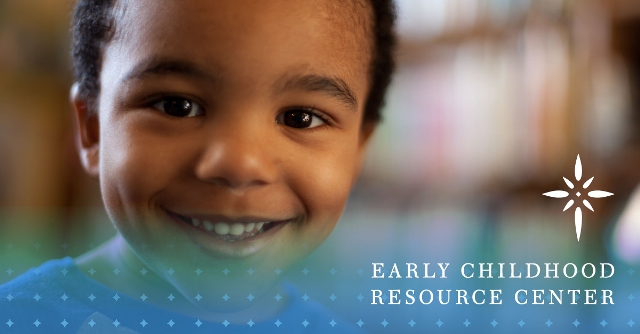Early Childhood Resource Center programs focus on social-emotional development for young children

All children need healthy social-emotional development to be ready for school. But developing strong social-emotional skills can be especially challenging for children living in poverty. These children may face transient living conditions, struggling families, food insecurity, unsafe neighborhoods and a host of other issues stemming from the constant challenge of meeting daily needs.
The Early Childhood Resource Center (ECRC) offers a number of programs for educators and families that focus on social-emotional development for young children, helping build foundations step by step so children are ready for school.
For Educators
CSEFEL Training: Offered for the First Time
Vanderbilt University’s Center on the Social and Emotional Foundations for Early Learning (CSEFEL) is funded by the Office of Head Start and the Child Care Bureau for the purpose of disseminating research and evidence-based practices to early childhood programs across the country.
ECRC Early Childhood Specialist Elisa Schleig will be delivering infant-toddler CSEFEL training to 25 Early Head Start providers and other educators. This marks the first time the Canton community’s educators will have access to this valuable course, which will be offered as four eight-hour modules over summer and fall 2016.
The course will cover CSEFEL’s evidence-based pyramid model for supporting social-emotional development through individualized interventions, teaching strategies, preventive practices and modeling positive relationships.
Baby Doll Circle Time: An Innovative Approach
Baby Doll Circle Time is an innovative and loving way for care providers to foster social-emotional development in young children. Developed by Dr. Becky Bailey, who is also the developer of the evidence-based Conscious Discipline program, Baby Doll Circle Time helps infants and young children learn empathy while feeling secure.
This curriculum improves relationships between caregivers and children, reduces the stress of being in out-of-home care, wires the brain for optimal development, and helps children develop healthy blueprints for self-regulation, relationships, and sense of self.
During Baby Doll Circle Time, the care provider models actions that the children imitate with their own baby dolls. The children feel nurtured and cared for as they recall times when they were nurtured, and they also learn how to be empathetic by practicing empathy toward the doll.
For Families
Parent Cafés: Powerful Discussions that Strengthen Families and the Community
Parent Cafés continue to be increasingly popular throughout the community. The collaboration occurring at the uniquely structured sessions, along with the relationship building and empathy that naturally emerge, are highly effective at helping parents strengthen the protective factors that prevent abuse, including parental resilience, social connections, and knowledge of parenting and child development.
Since September 2015, the ECRC has offered 31 Parent Café sessions in diverse locations throughout the community, run by 17 facilitators.
Happy To Be Me: A Great Foundation for Parents
Right from the start, babies are different from each other. Understanding these temperamental differences can help parents care for their children more responsively and effectively.
In the Happy To Be Me parenting course, parents of infants and young children are shown why healthy social-emotional development is the basis of all other learning. They learn easy ways to help their children feel secure. During the four two-hour sessions, they also come to understand how to respond to their children’s unique temperaments in ways that will facilitate their physical, intellectual and developmental needs.
SPARK: A Holistic Approach to Readiness
The SPARK kindergarten readiness program takes a holistic approach to school readiness. SPARK lessons focus on early literacy skills, but they also focus on strengthening the critical social-emotional skills that children will need to be ready for school. SPARK does this in several ways:
- Regular group sessions allow similar-age children (and the parents of those children) to socialize and work together to complete projects.
- Several lessons emphasize strengthening social-emotional skills, including the lessons on the books Lots of Feelings and the Kissing Hand.
- SPARK children are assessed regularly for social-emotional concerns, using the Ages and Stages Questionnaire: Social-Emotional. SPARK’s responsive services team is always standing by, ready to advise, if a child is experiencing issues that might prevent school readiness. The team knows that the sooner challenges are addressed, the likelier it is that a child will be ready to succeed in school.
SPARK’s multi-faceted approach is highly effective: the state-mandated Kindergarten Readiness Assessment (KRA) assesses incoming kindergarteners’ levels of several aspects of readiness, including social foundations (which measures social-emotional development and approaches toward learning). SPARK children significantly outscore their non-SPARK peers on the social foundations subscale of the KRA, among other subscales.
A ministry of the Sisters of Charity Health System, the Early Childhood Resource Center works to promote the healthy development of young children by: strengthening families, improving the quality of early learning experiences, increasing school and community readiness, and informing public policy.

- Sisters of Charity Health System
- News Releases
- St. Vincent Charity Health Campus
- Light of Hearts Villa
- Regina Health Center
- Sisters of Charity Foundation of Canton
- Sisters of Charity Foundation of Cleveland
- Sisters of Charity Foundation of South Carolina
- Building Healthy Communities
- Catholic Community Connection
- Early Childhood Resource Center
- Healthy Learners
- Joseph and Mary's Home
- South Carolina Center for Fathers and Families